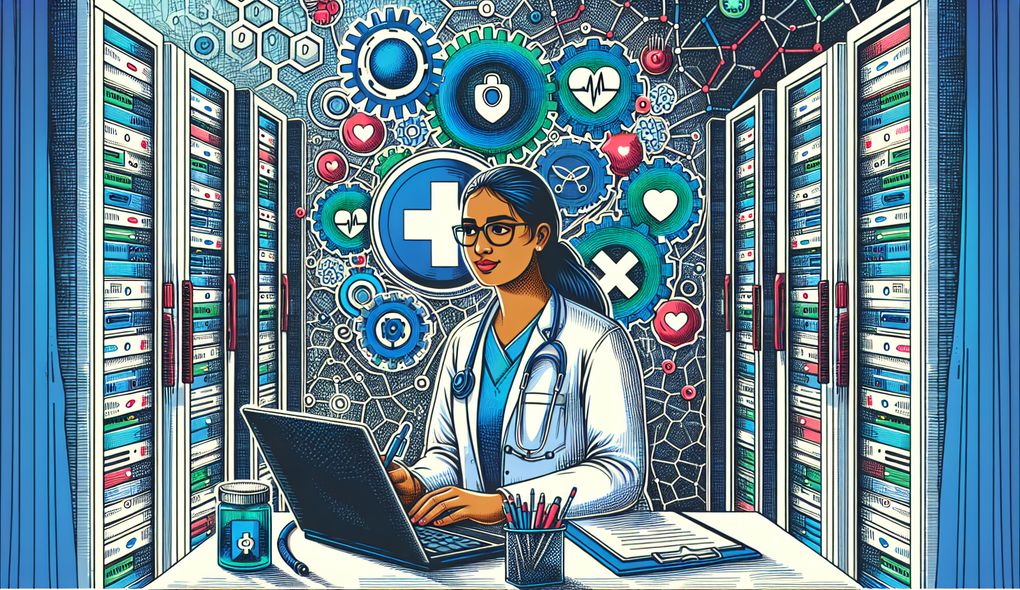What are the key cybersecurity principles and practices that a Healthcare IT Security Specialist should be familiar with?
JUNIOR LEVEL

Sample answer to the question:
The key cybersecurity principles and practices that a Healthcare IT Security Specialist should be familiar with include understanding healthcare IT compliance regulations such as HIPAA and HITECH. They should have basic knowledge of IT security concepts and best practices, and be familiar with security systems like firewalls, intrusion detection systems, and anti-virus software. Problem-solving skills and an analytical mindset are important, as well as the ability to collaborate with cross-functional teams. They should also stay updated on the latest cybersecurity threats and trends relevant to healthcare. Additionally, they should assist in implementing security controls, monitoring systems for security breaches, and conducting system audits for compliance with health information privacy laws.
Here is a more solid answer:
As a Healthcare IT Security Specialist, it is crucial to have a deep understanding of cybersecurity principles and practices. This includes being well-versed in healthcare IT compliance regulations like HIPAA and HITECH. Moreover, having a solid knowledge of IT security concepts and best practices is essential to effectively protect patient data and information systems. A Healthcare IT Security Specialist should be familiar with various security systems such as firewalls, intrusion detection systems, anti-virus software, authentication systems, log management, and content filtering. Problem-solving skills and an analytical mindset will be necessary to identify and mitigate potential security risks. Collaborating with cross-functional teams is vital to implement security controls and enhance the organization's cybersecurity measures. Staying updated on the latest cybersecurity threats and trends relevant to healthcare is crucial to proactively address emerging risks. Additionally, conducting regular system audits to ensure compliance with health information privacy laws is an important responsibility. Lastly, assisting in security incident response efforts and documentation will contribute to effectively managing security breaches and minimizing their impact.
Why is this a more solid answer?
The solid answer expands on the basic answer by providing more specific details and emphasizing the importance of each key point mentioned in the job description. It also includes the candidate's responsibility to assist in security incident response efforts and documentation, which is not mentioned in the basic answer. The solid answer can be further improved by providing examples or real-life experiences related to the role of a Healthcare IT Security Specialist.
An example of a exceptional answer:
As a Healthcare IT Security Specialist, a comprehensive understanding of cybersecurity principles and practices is paramount. You must not only be familiar with healthcare IT compliance regulations like HIPAA and HITECH but also have an in-depth knowledge of their practical applications within the healthcare domain. It is essential to stay updated on the evolving threat landscape and emerging trends, attending industry conferences and participating in relevant training programs. As a Healthcare IT Security Specialist, your expertise should extend beyond basic IT security concepts and include a deep understanding of encryption algorithms, network protocols, secure coding practices, and vulnerability assessment methodologies. By conducting regular penetration tests and vulnerability assessments, you can proactively identify and remediate any security weaknesses. Additionally, you should have hands-on experience with various security tools and technologies, such as SIEM (Security Information and Event Management) systems, endpoint protection solutions, and data loss prevention mechanisms. Your ability to collaborate and communicate effectively with cross-functional teams is crucial, as you will be working closely with IT professionals, healthcare providers, and executive stakeholders. Lastly, demonstrating a strong ethical foundation and upholding the principles of ethical behavior in business and information security is essential to gaining trust and maintaining credibility in this role.
Why is this an exceptional answer?
The exceptional answer goes above and beyond the solid answer by providing more comprehensive details and addressing additional aspects of the role. It emphasizes the practical applications of healthcare IT compliance regulations and the need for continuous learning and professional development. The exceptional answer also highlights the importance of hands-on experience with security tools and technologies, as well as the candidate's ability to collaborate and communicate effectively. It further emphasizes the candidate's ethical foundation, which is not mentioned in the solid answer. The exceptional answer provides a well-rounded and extensive understanding of the key cybersecurity principles and practices required for a Healthcare IT Security Specialist.
How to prepare for this question:
- Study and familiarize yourself with healthcare IT compliance regulations such as HIPAA and HITECH.
- Stay updated on the latest cybersecurity threats and trends relevant to the healthcare industry. Attend industry conferences and participate in relevant training programs.
- Gain hands-on experience with security tools and technologies commonly used in the healthcare industry, such as SIEM systems, endpoint protection solutions, and data loss prevention mechanisms.
- Expand your knowledge of IT security concepts and best practices beyond the basics. Learn about encryption algorithms, network protocols, secure coding practices, and vulnerability assessment methodologies.
- Develop strong collaboration and communication skills to effectively work with cross-functional teams, IT professionals, healthcare providers, and executive stakeholders.
- Cultivate a strong ethical foundation and uphold the principles of ethical behavior in business and information security.
What are interviewers evaluating with this question?
- Knowledge of cybersecurity principles and practices
- Understanding of healthcare IT compliance regulations
- Knowledge of IT security concepts and best practices
- Familiarity with security systems
- Problem-solving and analytical skills
- Collaboration skills
- Awareness of latest cybersecurity threats and trends
- Experience in implementing security controls and monitoring systems
- Ability to conduct system audits for compliance

